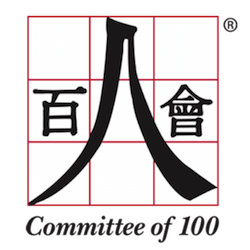FOR IMMEDIATE RELEASE
(中文见下)
Committee of 100 Urges Constructive Dialogue and Mutual Cooperation Around Affirmative Action in Higher Education
(New York, NY, October 24, 2017) — Admissions policies in higher education are being debated again. From the ongoing 2014 lawsuit by Students for Fair Admission against Harvard University alleging discrimination against Asian Americans by holding them to higher admissions standards, to the Justice Department’s current investigation of the same alleged race-based discrimination in Harvard’s admission policies, Asian Americans are finding themselves at the center of the affirmative action debate. These charges of bias are serious and should be investigated. Yet, in the ongoing discussion, the Committee of 100 urges all stakeholders to engage in thoughtful and constructive dialogue, and to refrain from rhetoric or actions that would pit one racial group against another and be unnecessarily divisive or counterproductive.
Providing the best education for the next generation is an essential part of the American Dream. Many immigrants have made major sacrifices so that their children can have the best educational opportunities. The Committee of 100 recognizes the anxiety and concerns of Asian American parents that potential racial discrimination may diminish educational opportunities for their children and deprive them of equal access to the American Dream. Asian Americans, native-born and immigrant alike, wish to be treated as individuals, not discriminated against unfairly on the basis of their race or ethnicity.
That Asian Americans are making their voices heard around this issue is commendable. For too long, Asian Americans have been stereotyped as being unwilling to stand up and speak out. But now, they have risen to their feet and are advocating for their equal rights.
Yet in the bigger picture, it is important to remember that Asian Americans have also benefited from civil rights protections and programs that promote diversity, whether they have been called “affirmative action.” Beyond education, Asian Americans will continue to require and rely on such protections and programs, especially in the workplace and in government contracts where qualified Asian Americans still often encounter glass ceilings or discriminatory treatment.
At the same time, in the realm of higher education, efforts to increase diversity among other minorities do not have to come at the expense of Asian American students. In fact, in the current lawsuit against Harvard, any discrimination Asian students may face is unrelated to such overall diversity efforts.
The issues around higher education access are complex but not new. All families, not just Asian Americans, want the best educational opportunities for their children. Addressing these complex issues will require a willingness on the part of those involved to explore a variety of creative solutions, from expanding seats at colleges and universities to improving college access for disadvantaged students, among other possibilities.
Questions of access to higher education have now become a political issue as much as a legal issue. As we await action from the Justice Department, Asian Americans would do well to proactively reach out to other concerned Americans to seek long-term solutions and redress beyond the courts. For the collective and long-term future of our children and the future of America, we need to work together to ensure equal opportunity and equal protection for all. A diverse and inclusive society only makes America stronger. Achieving this will require the wisdom, ingenuity, resources, trust, and goodwill of all involved, and a shared commitment to each other as fellow Americans.
The Committee of 100 is an international, non-partisan leadership organization of prominent Chinese Americans in business, government, academia, and the arts. For over 25 years, the Committee has been committed to a dual mission of promoting the full participation of Chinese Americans in all fields of American life, and encouraging constructive relations between the peoples of the United States and Greater China. www.committee100.org
###
 联系人:张虹琳,执行总监
联系人:张虹琳,执行总监
media@committee100.org 或 212-371-6565
百人会敦促相关方就高等教育平权法案展开对话与合作
(美国纽约州纽约市,2017年10月24日) — 高等院校录取政策再次陷入争论。从2014年起且至今一直在进行的由“学生争取公平录取”(Students for Fair Admission)组织对哈佛大学的诉讼,哈佛大学被控对亚裔学生持有更高的录取标准;直到近来,司法部开始调查在哈佛大学录取政策中可能存在的“种族歧视”,亚裔美国人发现自己正置身于平权法案之争的中心。这些关于偏见的指控非常严重,且应该展开调查;然而在这场持续的争论中,百人会敦促所有利益相关方展开深入而有建设性的对话,并且节制其言行,以避免造成种族对立和不必要的分裂,效果适得其反。
为下一代提供最好的教育是美国梦的重要组成部分。许多移民为了让他们的子女拥有最好的教育机会,做出了重大牺牲。亚裔父母存在焦虑和担忧,认为潜在的种族歧视会减少子女的教育机会,剥夺他们实现美国梦的平等机会。百人会对此充分理解。不管是本地出生还是移民而来的亚裔美国人,都希望被视为独立的个体,不因自身种族而受到歧视。
亚裔美国人在此问题上发声,值得称赞。长期以来,针对亚裔美国人的刻板印象一直是不愿挺身而出和公开表态 。而如今,他们已经站了起来,推动其自身的平等权利。
然而,在更宏大的背景下,至关重要的是,我们需要记住,亚裔美国人也从民权保护行动和促进多样性的项目中受益,不管这些是否被称为“平权行动”。除了教育,亚裔美国人还将继续要求和依赖这些行动和项目,尤其是在职场和政府合约方面。在这些领域,有能力的亚裔美国人仍然经常遇到玻璃天花板或歧视待遇。
与此同时,在高等教育领域,增加其他少数民族多样性的努力并不一定要以牺牲亚裔美国学生为代价。事实上,在当前对哈佛的诉讼中,亚裔学生可能面临的任何歧视都与这种增加多样性的努力无关。
关于获取高等教育的问题虽然复杂,却并不新颖。所有的家庭——不仅仅是亚裔美国人——都想要为他们的孩子提供最好的教育。解决这些复杂的问题,需要参与者去探索各种创造性的解决方案,其中包括扩大招生,改善弱势学生的入学机会等等。
目前,关于高等教育的问题不仅是一个司法议题,也已经成为一个政治议题。在我们等待司法部行动的同时,亚裔美国人应积极主动地与其他关心此事的美国人接触,寻求长期的、在法庭之外的解决方案。为了我们的孩子共同而长远的未来,以及美国的未来,我们需要共同努力,确保人人享有平等的机会和平等的保护。一个多元而包容的社会只会让美国更强大。实现这一目标需要智慧、创新、资源、信任、当事各方的良好愿望、以及我们美国人对彼此的共同承诺和付出。
百人会是一个由杰出美国华人组成的国际性、非党派团体,成员来自商界、政界、学术、和文艺界。成立二十五年来,百人会一直致力于其两大使命,推动美国华人在美国社会各领域的全面参与,促进美国与大中华地区人民之间的建设性关系。更多信息:www.committee100.org.
###